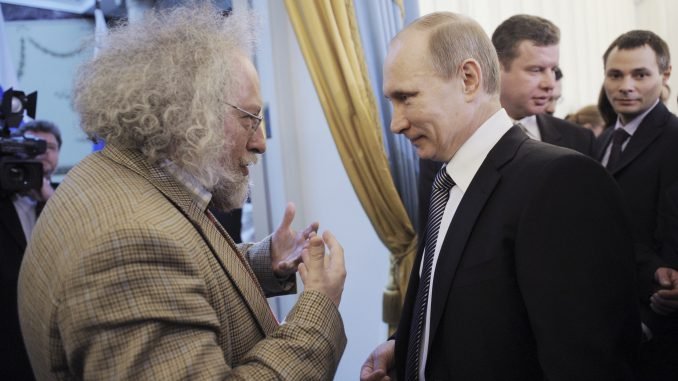
“People are suspicious, they understand and believe that they are being tricked and manipulated. Don’t think that Russia is full of idiots,” said Venediktov of the falling trust of Russian media.
The independent Echo Moskvy radio station, considered by some to be the last of its kind in Russia, has had more than a few troubles with the Russian establishment. The station’s journalists have received death threats, and the station was once accused of extremism by Russia’s Federal Service for Supervision of Communications after airing a show with two journalists who discussed their coverage of the battle for Donetsk airport in Ukraine. Russian president Vladimir Putin has accused the radio station of mudslinging.
“A year ago, we received a warning for a live broadcast,” said Venediktov. “That cannot happen. The media should not answer for its live broadcasts. The show had guests who spoke about and shared their evaluations of the situation in Donetsk airport. What if Vladimir Putin visited me and I received a warning because of this? Or Barack Obama? Why? That contradicts everything that should be, and yet the ‘court’ – and we should use that in quotes – made that decision.”
During the interview, he had strong words about public and governmental opinions on Russian journalists. “The Russian government will never investigate the murders of journalists as enthusiastically as they would the murders of businessmen or deputies or ordinary murders. Journalists are another issue entirely, and this signal travels to the very top: sure, they were killed, sure, it should be investigated, so investigate it.”
“Over 15 years of Putin’s leadership, not a single investigation into the murder of a journalist has revealed who ordered it done. Sometimes they find the murderers, other times they find the organisers, but they never find who ordered the crimes. This is the greatest threat. When the leader of Chechnian state institutions allows himself to make direct threats, and the government simply ignores it, they’re sending those same clear signals. I only walk around with security, double security.”
When asked about the lack of solidarity or unity among journalists, Venediktov said, “every journalist represents their own media outlet, which, in turn, follows its own editorial policies. Listen, it’s not like a journalists’ professional union, which could demand concessions for themselves from the president. Every media outlet is oriented towards its listeners or its owners, or to the governmental region it works in. There, a journalist’s work is quite different.”
Given the icy reception to journalists in Russia, many have traveled to the Baltic states and other surrounding countries to continue their work. Venediktov, however, was sceptical of this approach; “To analyse processes, you need to establish relationships with the people participating in those processes. You need to interview them, to drink tea or other drinks. You must follow their behaviour in natural settings, not just when they’re on TV. That’s why you need to be in Russia, to maintain contacts with them, meet them and talk to them.” He added that “those who work from abroad often have a more superficial and observatory approach, instead of an analytical perspective. That’s not their fault but it is their weakness. And I’d be the last to throw a rock at my own colleagues.”
Misunderstandings can also sometimes cloud the media’s relationship with the Russian government. “When Putin once again publicly announced that Echo spent every day, morning to night, slinging mud at him, I tried to figure out why and discovered that Putin was being presented with printed-out comments. I must admit that they really are nasty and very personal, but we let them through, we didn’t delete them. We receive tens of thousands of comments in a day, we can’t monitor all of them. He had the comments in mind, and he thought that I am responsible for them because it’s my website.”
Venediktov enjoys a closer relationship with Putin than most journalists, which is something that some have criticised him for. Regardless, Putin has never appeared for an interview on Echo. “Vladimir Vladimirovich and I were acquaintances until he was elected. We weren’t close, but we knew each other. We were, let’s say, attentive with one another.”
The last interesting conversation Venediktov had with Putin, he recalls, was in June. “There was a meeting with media editors-in-chief, and after that, when he came to say goodbye, I told him – ‘Vladimir Vladimirovich, you know what, I no longer understand you, I really don’t. What are we doing there?’ He told me: ‘And why should you?’ ‘What do you mean ‘why,’ I’m a public figure. I’m trying to tell you how I understand things. We should speak more often, you could explain your motives in a closed session.’ ‘Ah,’ – he said. ‘Understood. Maybe you don’t need to?’ And then he left.”

Be the first to comment